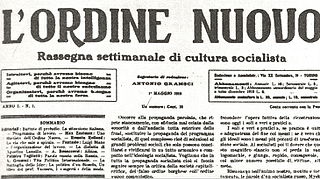
Cultural imperialism, also called cultural colonialism, comprises the cultural aspects of imperialism. "Imperialism" here refers to the creation and maintenance of unequal relationships between civilizations, favoring a more powerful civilization. Thus cultural imperialism is the practice of promoting and imposing a culture over a less powerful society. This may take the form of cultural hegemony of industrialized or politically and economically influential countries influencing general cultural values and standardizing (globalising) civilizations elsewhere.

Fascism is a form of far-right, authoritarian ultranationalism characterized by dictatorial power, forcible suppression of opposition and strong regimentation of society and of the economy which came to prominence in early 20th-century Europe. The first fascist movements emerged in Italy during World War I, before spreading to other European countries. Opposed to liberalism, democracy, Marxism, and anarchism, fascism is placed on the far right within the traditional left–right spectrum.
Communication studies or communication sciences is an academic discipline that deals with processes of human communication and behavior, patterns of communication in interpersonal relationships, social interactions and communication in different cultures. Communication is commonly defined as giving, receiving or exchanging ideas, information, signals or messages through appropriate media, enabling individuals or groups to persuade, to seek information, to give information or to express emotions effectively. Communication studies is a social science that uses various methods of empirical investigation and critical analysis to develop a body of knowledge that encompasses a range of topics, from face-to-face conversation at a level of individual agency and interaction to social and cultural communication systems at a macro level.

The Christian Democratic Centre was a Christian-democratic political party in Italy from 1994 to 2002. The CCD was a member of the European People's Party (EPP).
In media studies, mass communication, media psychology, communication theory, and sociology, media influence and media effects are topics relating to mass media and media culture's effects on individual or an audience's thoughts, attitudes, and behavior. Whether it is written, televised, or spoken, mass media reaches a large audience. Mass media's role and effect in shaping modern culture are central issues for study of culture.

Everyday life, daily life or routine life comprises the ways in which people typically act, think, and feel on a daily basis. Everyday life may be described as mundane, routine, natural, habitual, or normal.

The Digital Revolution is the shift from mechanical and analogue electronic technology to digital electronics which began in the latter half of the 20th century, with the adoption and proliferation of digital computers and digital record-keeping, that continues to the present day. Implicitly, the term also refers to the sweeping changes brought about by digital computing and communication technology during this period. Analogous to the Agricultural Revolution and Industrial Revolution, the Digital Revolution marked the beginning of the Information Age.

The Pole of Freedoms was a centre-right political and electoral alliance in Italy, launched at the 1994 general election by Silvio Berlusconi. Its counterpart in central and southern Italy was the Pole of Good Government.

The Pole of Good Government was a centre-right electoral, and later political alliance in Italy, launched at the 1994 general election by Silvio Berlusconi. Its counterpart in Northern Italy was the Pole of Freedoms.

The social aspects of television are influences this mediums had on society since its inception. The belief that this impact has been dramatic has been largely unchallenged in media theory since its inception. However, there is much dispute as to what those effects are, how serious the ramifications are and if these effects are more or less evolutionary with human communication.
Media is the communication outlets or tools used to store and deliver information or data. The term refers to components of the mass media communications industry, such as print media, publishing, the news media, photography, cinema, broadcasting, and advertising.

Elayne Antler Rapping was an American critic and analyst of popular culture and social issues. She authored several books covering topics such as media theory, popular culture, women's issues, and the portrayal of the legal system on television. As a regular contributor to such publications as The Nation, The Progressive, and The New York Times, she wrote on a wide variety of cultural issues including film and movie reviews.

Erik Walter Gandini is an Italian-Swedish film director, writer, and producer and one of the co-founders of production company ATMO.

News is information about current events. This may be provided through many different media: word of mouth, printing, postal systems, broadcasting, electronic communication, or through the testimony of observers and witnesses to events.
Videocracy is a 2009 documentary film directed by Swedish-Italian Erik Gandini about Italian television and its impact on Italian culture and politics, and about Silvio Berlusconi's powerful position on all of these. Gandini coined the phrase "The Evilness of Banality" to describe the cultural phenomenon of Berlusconism, thus making a word play on Hannah Arendt's "Banality of Evil".
Small Media, Big Revolution: Communication, Culture, and the Iranian Revolution is a book by Annabelle Sreberny-Mohammadi and Ali Mohammadi. First published by the University of Minnesota Press in 1994, it deals with how small media played an important role in the revolution that deposed the Shah of Iran.

L'Ordine Nuovo was a weekly newspaper established on 1 May 1919, in Turin, Italy, by a group, including Antonio Gramsci, Angelo Tasca and Palmiro Togliatti, within the Italian Socialist Party. The paper was the successor of La Città futura, a broadsheet newspaper. The founders of L'Ordine Nuovo were admirers of the Russian Revolution and strongly supported the immediate creation of soviets in Italy. They believed that existing factory councils of workers could be strengthened so that they could become the basis of a communist revolution. However, Amadeo Bordiga, who would become the founder of the Communist Party of Italy, criticised the plan as syndicalism, saying that soviets should only be created after Italy had come under communist control.
Annabelle Sreberny is a writer, scholar, and professor of Global Media and Communication and Director of the Centre for Media and Film Studies at SOAS. She writes on globalization, communication, and culture with specific foci on international news and Iran.

Mahmoud Jafarian was an Iranian politician under the last Shah of Iran, Mohammad Reza Pahlavi. He served simultaneously as deputy director for National Iranian Radio and Television (NIRT), managing director of Pars News Agency, and Vice President of the Rastakhiz Party.

Rahmatollah Moghaddam Maraghei was an Iranian politician. A co-founder of the Iranian Writers' Association (IWA), he briefly served as a member of the parliament in the early 1960s, but was ousted for criticizing the Shah. Following the Iranian Revolution, he was elected to the constituent assembly and was considered among the opposition bloc to the Islamic Republican Party. He went into hiding and fled the country after he was prosecuted for espionage.













